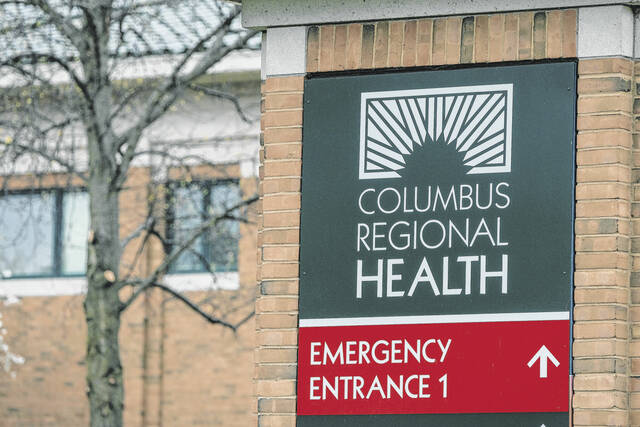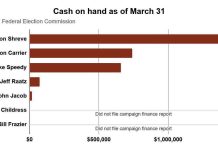Health care workers in Columbus and Seymour will soon be getting vaccinated against COVID-19 — if they want to keep their jobs.
Columbus Regional Health and Schneck Medical Center in Seymour in a joint statement said all employees, medical staff, students, volunteers and contractors will be required to be fully vaccinated by Jan. 4 to comply with a federal mandate for health care workers.
The announcement comes nearly three weeks after the federal government moved to require health care facilities that receive funds from the Medicare and Medicaid programs to ensure all employees are vaccinated by Jan. 4, a measure that will affect 17 million workers across the country, including at least 3,300 in the Columbus area.
Health care facilities that do not comply with the federal requirement risk possible payment denials and termination from the Medicare and Medicaid programs, according to the Centers for Medicare and Medicaid Services.
CRH, which employs about 2,200 people, said just more than 70% of its staff was fully vaccinated as of Nov. 15. Schneck, for its part, employs about 1,100 people, with more than 70% who were fully vaccinated as of the end of September.
That means potentially up to 660 workers at CRH and up to 330 at Schneck remain unvaccinated. Employees and other staff subject to the requirement who do not comply with the vaccine requirement and do not have a valid exemption or deferral will lose their jobs, the hospitals said.
“The majority of patients served by Columbus Regional Health and Schneck Medical Center are covered by Medicare or Medicaid,” the two hospitals said in the statement. “It is imperative our organizations remain a provider in these programs so we can continue to provide care to our communities.”
Deadlines and exemptions
Under the federal requirement, health care workers at CRH and Schneck must submit proof that they have received their first dose of a two-dose vaccine or the single-dose Johnson &Johnson vaccine by Dec. 5 — in 12 days, the statement says. Those who opt for a two-dose vaccine must receive their second shot by Jan. 4.
Unlike a separate federal mandate on workers at companies with at least 100 employees, the vaccine requirement for health care workers does not include an option for regular testing in lieu of vaccination.
However, some exemptions exist for workers who provide proof of a “sincerely held religious belief,” as well as certain disabilities and medical conditions by Dec. 5, according to the Centers for Medicare and Medicaid Services.
CRH spokeswoman Kelsey DeClue said the hospital system notified employees some time ago about the vaccine requirement to allow them time to consult with their health care provider, schedule vaccine appointments or gather the documentation they would need to request an exemption.
CRH has already received requests for religious and medical exemptions but officials were unable to say on Tuesday how many people had filed them.
“We have had both religious and medical exemptions coming in, just like we do with the flu (vaccine),” DeClue said.
Legal challenges
Several states — including Indiana — have filed lawsuits challenging the vaccine requirement for health care workers.
Ten states — Missouri, Nebraska, Arkansas, Kansas, Iowa, Wyoming, Alaska, South Dakota, North Dakota and New Hampshire — filed a lawsuit Nov. 10 in U.S. District Court for the Eastern District of Missouri, arguing that the requirement could deepen the shortage of health care workers and violates the rights of states to decide whether to mandate vaccinations.
On Nov. 15, another 12 states — Indiana, Louisiana, Montana, Arizona, Alabama, Georgia, Idaho, Mississippi, Oklahoma, South Carolina, Utah and West Virginia — filed a separate lawsuit in the Monroe division of the U.S. District Court for the Western District of Louisiana, arguing that the requirement is unconstitutional and violates federal law.
“The Biden Administration is playing statutory shell games with the courts, straining to justify an unjustifiable and unprecedented attempt to federalize public health policy and diminish the sovereign States’ constitutional powers,” according to the complaint, which lists Indiana Attorney General Todd Rokita as a plaintiff.
Both lawsuits were pending in federal court as of Tuesday morning.
CRH and Schneck are aware of the legal challenges, officials from both hospitals said Tuesday.
“We will follow the regulations that are set forth by CMS,” said Stephanie Furlow, director of marketing at Schneck. “Whatever they decide is what we will follow. …We cannot not provide Medicare and Medicaid to our communities.”
CRH consulted a legal team that included attorneys from Ice Miller, among other experts, before making Tuesday’s announcement, DeClue said.
“We’re following those legal challenges,” DeClue said. “We’re following the guidance very regularly, and of course, we’ll be ready to adjust our plans as needed. But as of right now, we just don’t really see any indication that this course of action is going to change for what CMS has put out.”
Other requirements
Vaccine requirements are not new in the medical field. For instance, CRH also requires staff to be vaccinated against certain illnesses as a condition of employment — including influenza, tuberculosis and hepatitis — but allows for certain exceptions due to medical or religious reasons, hospital officials said in a previous interview.
In July, more than 50 medical groups — including the American Medical Association, American College of Physicians, American Academy of Pediatrics and American Public Health Association — urged health care employers to require all staff to get vaccinated against COVID-19, citing the spread highly contagious variants and “significant numbers of unvaccinated people,” including health care workers.
In the statement, the group says requiring COVID-19 vaccines among staff will protect their colleagues, families, long-term care residents and patients, characterizing such mandates as “the logical fulfillment of the ethical commitment of all health care workers.”
“This pandemic remains a very real threat to our communities, our patients and our workforce members,” CRH President and CEO Jim Bickel said in a statement Tuesday. “As healthcare professionals and those who provide care for our patients each and every day, we understand the importance of the vaccine in minimizing severe illness and loss of life.”





